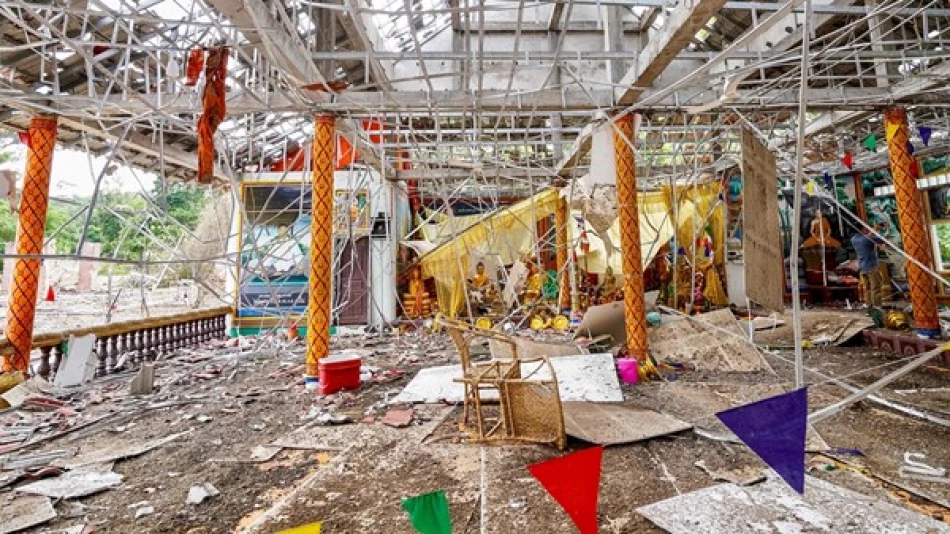
Cambodia Calls for Ceasefire with Thailand Amid Border Tensions
Southeast Asian Border Crisis: Cambodia-Thailand Clashes Claim 33 Lives as UN Security Council Convenes Emergency Session
A deadly border dispute between Cambodia and Thailand has escalated into the region's worst military confrontation since 2011, with 33 confirmed deaths and over 173,000 civilians evacuated from their homes. The two-day conflict has drawn international attention, prompting an emergency UN Security Council meeting and direct intervention from world leaders as fighter jets, tanks, and artillery fire transform disputed border territories into active war zones.
Unprecedented Escalation Marks New Chapter in Historic Dispute
The current violence represents a dramatic escalation from previous border skirmishes that killed 28 people between 2008 and 2011. Cambodia's Defense Ministry reported 13 deaths and 71 injuries on Saturday, while Thailand's military confirmed 20 fatalities, including 14 civilians and five soldiers killed on Friday alone.
The intensity of this conflict marks a concerning departure from the relatively stable border management both countries had maintained over the past decade. Unlike previous incidents that were largely contained to ground forces, this confrontation has involved sophisticated military assets including fighter aircraft and heavy artillery, suggesting both nations view the current dispute as more strategically significant than past disagreements.
Geographic Flashpoint Reignites Ancient Tensions
The fighting centers around Borsat Province on the Cambodian side, where journalists reported hearing sustained artillery bombardment near the tree-covered hills that mark the international boundary. Thai residents in Sisaket Province, approximately 10 kilometers from the border, also confirmed hearing heavy shelling.
"All I want is for this to end as quickly as possible," said Sothian Viochan, a Thai resident whose sentiment reflects the war-weary population on both sides of this historically contested frontier.
Diplomatic Efforts Clash with Military Realities
Cambodia's UN Ambassador Chea Keo emerged from Saturday's closed-door Security Council session calling for an "immediate, unconditional ceasefire" and peaceful resolution to the dispute. However, Thailand's Foreign Minister Maris Sangiambongsa demanded Cambodia demonstrate "real credibility to end the conflict" while accusing Phnom Penh of violating Thai sovereignty.
This diplomatic standoff reflects deeper strategic calculations. Both governments face domestic pressure to appear strong on territorial integrity, while regional powers watch nervously as the conflict threatens ASEAN's carefully maintained principle of non-interference in member states' affairs.
International Stakes Rise as Great Powers Take Notice
Former U.S. President Donald Trump's direct communication with both nations' leaders from Scotland signals how quickly this border dispute has captured global attention. Such high-level intervention suggests international concern that the conflict could destabilize Southeast Asia's economic recovery and complicate regional security arrangements.
The timing is particularly sensitive as both countries navigate post-pandemic economic challenges and increasing geopolitical competition between China and the United States in Southeast Asia. Neither Cambodia nor Thailand can afford prolonged military expenditure or the economic disruption that extended conflict would bring.
Regional Implications Beyond the Immediate Crisis
The massive civilian displacement—138,000 Thais and 35,000 Cambodians forced from their homes—creates humanitarian pressures that could outlast any ceasefire agreement. This population movement strains local resources and creates potential refugee flows that neighboring countries will need to address.
For ASEAN, this crisis tests the organization's conflict resolution mechanisms at a time when the bloc faces multiple challenges, from Myanmar's military coup to South China Sea tensions. The association's credibility as a stabilizing force depends partly on its ability to facilitate peaceful resolution between two founding members.
The international community's response will likely influence how future territorial disputes unfold across Asia, where numerous unresolved border issues simmer beneath the surface of economic cooperation agreements. Success in mediating this conflict could strengthen multilateral diplomacy, while failure might encourage more unilateral military approaches to territorial disputes.
Most Viewed News

 Layla Al Mansoori
Layla Al Mansoori






